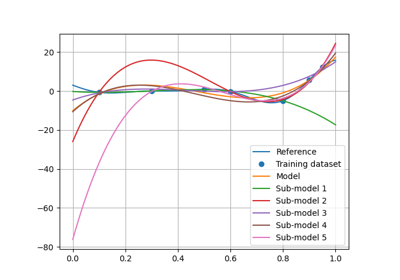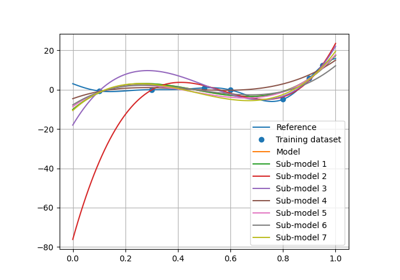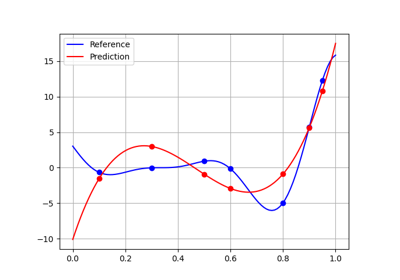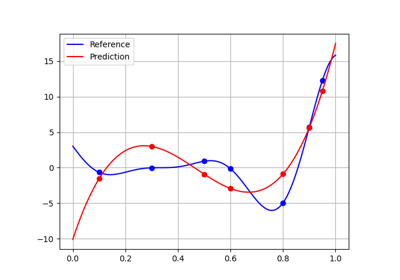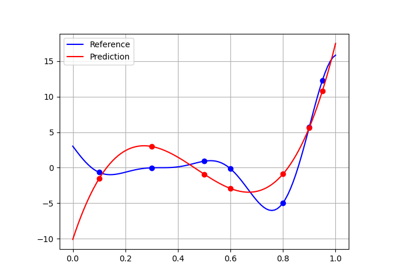regression module¶
This module contains the baseclass for regression algorithms.
The regression module
implements regression algorithms,
where the goal is to find relationships
between continuous input and output variables.
After being fitted to a learning set,
the regression algorithms can predict output values of new input data.
A regression algorithm consists of identifying a function
\(f: \\mathbb{R}^{n_{\\textrm{inputs}}} \\to
\\mathbb{R}^{n_{\\textrm{outputs}}}\).
Given an input point
\(x \\in \\mathbb{R}^{n_{\\textrm{inputs}}}\),
the predict method of the regression algorithm will return
the output point \(y = f(x) \\in \\mathbb{R}^{n_{\\textrm{outputs}}}\).
See supervised for more information.
Wherever possible, the regression algorithms should also be able to compute the Jacobian matrix of the function it has learned to represent. Thus, given an input point \(x \\in \\mathbb{R}^{n_{\\textrm{inputs}}}\), the Jacobian prediction method of the regression algorithm should return the matrix
This concept is implemented through the BaseMLRegressionAlgo class
which inherits from the BaseMLSupervisedAlgo class.
- class gemseo.mlearning.regression.regression.BaseMLRegressionAlgo(data, transformer=mappingproxy({}), input_names=None, output_names=None, **parameters)[source]
Bases:
BaseMLSupervisedAlgoMachine Learning Regression Model Algorithm.
Inheriting classes shall implement the
BaseMLSupervisedAlgo._fit()andBaseMLSupervisedAlgo._predict()methods, andBaseMLRegressionAlgo._predict_jacobian()method if possible.- Parameters:
data (IODataset) – The learning dataset.
transformer (TransformerType) –
The strategies to transform the variables. The values are instances of
BaseTransformerwhile the keys are the names of either the variables or the groups of variables, e.g."inputs"or"outputs"in the case of the regression algorithms. If a group is specified, theBaseTransformerwill be applied to all the variables of this group. IfIDENTITY, do not transform the variables.By default it is set to {}.
input_names (Iterable[str] | None) – The names of the input variables. If
None, consider all the input variables of the learning dataset.output_names (Iterable[str] | None) – The names of the output variables. If
None, consider all the output variables of the learning dataset.**parameters (MLAlgoParameterType) – The parameters of the machine learning algorithm.
- Raises:
ValueError – When both the variable and the group it belongs to have a transformer.
- DataFormatters
alias of
RegressionDataFormatters
- predict_jacobian(input_data)[source]
Predict the Jacobians of the regression model at input_data.
The user can specify these input data either as a NumPy array, e.g.
array([1., 2., 3.])or as a dictionary, e.g.{'a': array([1.]), 'b': array([2., 3.])}.If the NumPy arrays are of dimension 2, their i-th rows represent the input data of the i-th sample; while if the NumPy arrays are of dimension 1, there is a single sample.
The type of the output data and the dimension of the output arrays will be consistent with the type of the input data and the size of the input arrays.
- Parameters:
input_data (DataType) – The input data.
- Returns:
The predicted Jacobian data.
- Return type:
NoReturn
- predict_raw(input_data)[source]
Predict output data from input data.
- Parameters:
input_data (RealArray) – The input data with shape (n_samples, n_inputs).
- Returns:
The predicted output data with shape (n_samples, n_outputs).
- Return type:
RealArray
- DEFAULT_TRANSFORMER: DefaultTransformerType = mappingproxy({'inputs': <gemseo.mlearning.transformers.scaler.min_max_scaler.MinMaxScaler object>, 'outputs': <gemseo.mlearning.transformers.scaler.min_max_scaler.MinMaxScaler object>})
The default transformer for the input and output data, if any.
- algo: Any
The interfaced machine learning algorithm.
- learning_set: Dataset
The learning dataset.
- resampling_results: dict[str, tuple[BaseResampler, list[BaseMLAlgo], list[ndarray] | ndarray]]
The resampler class names bound to the resampling results.
A resampling result is formatted as
(resampler, ml_algos, predictions)whereresampleris aBaseResampler,ml_algosis the list of the associated machine learning algorithms built during the resampling stage andpredictionsare the predictions obtained with the latter.resampling_resultsstores only one resampling result per resampler type (e.g.,"CrossValidation","LeaveOneOut"and"Boostrap").
- transformer: dict[str, BaseTransformer]
The strategies to transform the variables, if any.
The values are instances of
BaseTransformerwhile the keys are the names of either the variables or the groups of variables, e.g. “inputs” or “outputs” in the case of the regression algorithms. If a group is specified, theBaseTransformerwill be applied to all the variables of this group.

